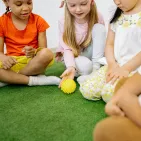
This blog is based on the 12 Tips for Christmas: Holiday considerations for neurodiverse families episode from the Where You Are Podcast.
With the holiday season approaching, it's important to acknowledge that every family is unique and that the holiday season does not look the same for all. If you have neurodivergent kiddos, seasonal events and gatherings outside of carefully established routines may or may not feel merry and bright.
So in preparation for the holiday season, with all the nuances and complexities that can accompany it, here are some tips for consideration that might help you guide the event planning to meet the variety of needs in your family.
- Simplify demands.
When you’re preparing for your plans over the winter holidays, pick a few priority things and give yourself grace if you can’t attend everything. Your best laid plan may still not go as planned.
- Spread things out.
In addition to simplifying the number, reducing the number, and going for more of a good experience for everybody, think about how you pace yourself through the holidays. If you're going to do three or four things in two weeks, and you think, "I've nailed this. I've simplified it. We've been able to say what's the priority for us? We're excited about this," maybe don't do those four things all in a row. Because by time three you might be disappointed that they couldn't have experienced it well, but if you had spread them out two days apart, it gives a real decompression for each event.
- Share your needs and set expectations with others.
Connect with your guests or hosts for events in advance, explaining your family’s needs. Offer some suggestions for what makes your child comfortable. Let them know that you may have to leave early without announcing and be flexible. This is not a reflection on them, you are simply prioritizing what works for your family and you are always happy to connect again at another time in the new year.
- Re-evaluate traditions that no longer serve you.
Be intentional about what traditions you’d like to keep in your household. Ask yourself, "How many of these things do I just do on autopilot? How many of these things do I actually enjoy? Make me feel closer to people? Help me celebrate whatever faith tradition I have. Are these things that I actually feel are valuable? Or have I always just done it because that was a passed down tradition for the sake of tradition?"
- Attune to your kids’ physiological cues.
Physiological clues tend to come before big feelings and behaviours. You may watch for physical signs such as an increased heart rate or dilated pupils. Alternatively, a child who is not responding to you at all when you're asking questions may also be a sign of overwhelm. Noticing their posture, their eye contact, their response to anything, your touch, your gaze, and your questions, may all help you prevent an elevated response.
- Your kids might surprise you.
They might surprise you and enjoy something that you didn't think they would. In the opposite way, you might think that they're ready for something and they might surprise you that they're not. Regardless of the result, continue to celebrate your child’s strengths and unique approaches to holiday experiences and festivities.
- Consider how you refresh and remember what may happen after the holidays are over.
Change takes time. It's just as much of a change to go from your routine into something special and unstructured as it does to go back to a routine. To get back into that mindset of a routine is not an easy transition and can take time. Allow for that in your planning and timelines as you settle into the new year.
For more tips, listen to the full podcast episode 12 Tips for Christmas: Holiday considerations for neurodiverse families.
Are you a parent or caregiver and looking for more resources to support your family’s mental health and wellbeing? Check out our resource library and sort by topic.







